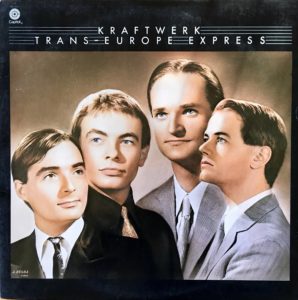
I don’t listen to a lot of electronic music. The music I’m mostly interested in hearing these days is all about hearing guitars that sound like guitars, drums that sound like drums and bass that sounds like bass. How do I decide if a sound produced electronically sounds natural, real, accurate? Can a vinyl pressing of electronic music really improve on a cd or digital download? Is it really worth investing in vinyl pressings of electronic bands?
In recent years I have had the pleasure of discovering the German band Kraftwerk – no less than the earliest pioneers in electronic music. A few years ago I bought a couple of recent vinyl reissues of Autobahn and Trans-Europe Express, along with a Dutch original of Computer World and love all of them. Kraftwerk’s songs were heavily sampled in early days of hip hop, especially from Computer World, and it’s been a blast to hear songs that I’ve heard so many times before in a completely different context.
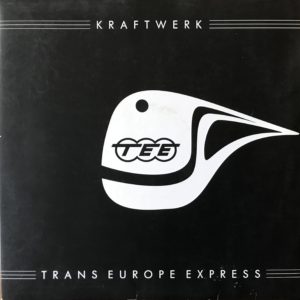
Of the two reissues, Trans-Europe Express is probably my favorite. It was released by Kling Klang and Parlaphone in Europe in 2009. Each of Kraftwerk’s albums is a concept album with photography and artwork in support of that concept. Each of their albums is an art piece in itself. The artwork for Trans-Europe Express uses staged, studio photography of the band members, complete with the retro studio logos just to the side of the images. It’s all extremely well done and adds a great deal to the listening experience. As the album plays these photographs help bring the sounds and themes in the music to life.
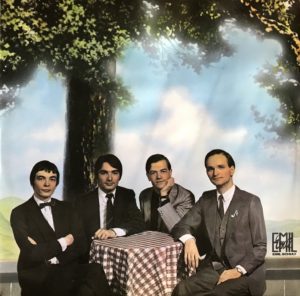
The question is, does the record manage to bring the music to life? As you know if you’ve read any of my earlier posts, I’m not a big fan of modern reissued vinyl pressings, and while I’ve enjoyed playing the Kraftwerk lp’s I bought, I’ve also found them to suffer from the same issues I find other recent vinyl reissues suffer from. Flatness, opacity, flabby bass and an overall lifelessness are, in my mind, the hallmark of the modern reissue. It’s the reason I’ve stopped writing “Vintage vs. Reissue” posts. It’s almost never a fair fight. The vintage pressings almost invariably clobber the modern reissue.
Still, I wondered about these Kraftwerk reissues. Given the fact that their music is all electronic, would different mastering really make a difference? I was very excited when I found a minty first US pressing of Trans-Europe Express a few weeks ago, and I hoped this would be the record to answer the question- “Does mastering matter with electronic music?”
When I finally got around to doing the shoot out the other day the answer was a definitive “Yes!”
Here are some of my notes from the shoot out:
2009 Reissue – tight, clear, bass is rubbery, subdued, vocals clear, but overall feels too restrained
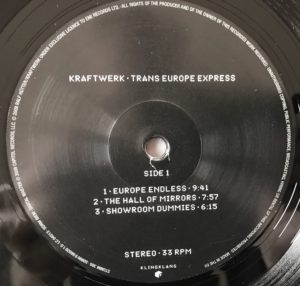
Vintage – bigger!, more open and spacious, bass is tighter, metallic sounds sound more metallic, albeit a bit harsh, vocals a bit distant, but there is the sound of studio space around them that makes them more engaging
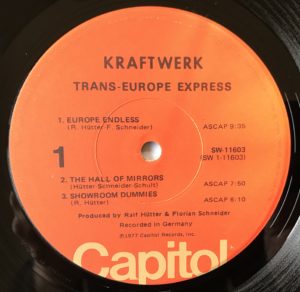
Overall the US vintage pressing is a much better fit for the music. The Reissue feels too small, restrained and had absolutely no “Wow” factor. IOW, a bit of a bore.
It’s interesting to me that even though the bass is from a keyboard on this record, the rubbery quality I hear in the bass of so many modern reissues, and even modern records in general, was still a problem. This was not at all an issue on the vintage pressing. I’m sure this is in part due to the 180g format and the fact that I generally don’t bother adjusting the VTA on my tonearm for a 180g vinyl record unless I’m hearing enough promising sonics to start with, which I rarely do. Nonetheless I would really need to adjust VTA to give most 180g reissues a truly fair shake, I realize that.
In the case of Trans-Europe Express, the difference in the mastering stood out so dramatically that it would never matter whether the VTA was adjusted for the thicker record or not. Good mastering is all about conveying the artists work to the listener in the a way that is as engaging as possible. The early US pressing was just flat out more fun to listen to. The reissue, by comparison, would make good background music at best. The artists and their work deserve better.